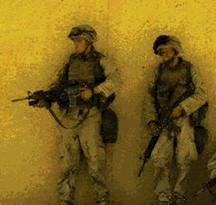
In November 2004, 20 months after theUnited Statesoverthrew Saddam Husseins dictatorship, three University of Notre Dame experts with differing viewpoints met to address the question:Should theU.S.withdraw, stay the course, or engage more deeply inIraq?Now, another 15 months later, the panelists will meet again, at4:15 p.m.Jan. 31 (Tuesday), to ponder the question:Iraq: What now?The discussion in the auditorium of theHesburghCenterfor International Studies is free and open to the public.
The panelists will be Lt. Col. Kelly Jordan, commanding officer of Notre Dames Army ROTC;Dan Lindley, assistant professor of political science; and George Lopez, senior fellow of the Joan B. Kroc Institute for International Peace Studies.
Lindley, who previously argued that theU.S.should engage more deeply inIraq, will note that his perspective has changed.
Last year, I recommended that we treatIraqlike the emergency it is and ramp up forces considerably as security is an essential pre-condition for political and economic development,he said.This year, that course is politically impossible, and the range ofU.S.options is greatly constrained.
Lopez suggested in 2004 that theU.S.should begin a staged withdrawal that would allow for the Iraqi government to get on its feet. Now, hes skeptical that American troops can accomplish anything.
The only difference theU.S.makes is that it protects some Iraqis in the green zone from being attacked,he said.Other than that, our presence provides a good target, a rallyingrationale to bind together varied violent groups, and creates little incentive for Iraqi political forces or the army to take control of their future.
Jordanwill provide the Defense Department position ofstaying the courseinIraq.He replaces the previous ROTC panelist, assistant professor of military science Gary Masapollo, who has been assigned to the naval station atGuantanamo Bay,Cuba, where he serves on a tribunal reviewing cases of detainees.
The event is sponsored by the Kroc Institute, the ROTC Command, and the Center for Social Concerns.
_ Contact: Julie Titone, director of communications, Kroc Institute, 574-631-8819, jtitone@nd.edu _
TopicID: 15405